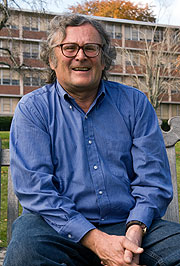  |
| HOME | THIS ISSUE | CALENDAR | GRANTS | BACK ISSUES | < BACK | NEXT > |
New essay collection seen as tribute to professor of diplomatic historyby Scott Brinckerhoff - December 3, 2007 | |||
| Students can often identify a teacher or two who shepherded them through their academic careers and shaped their thinking for decades to come. For UConn political science professor J. Garry Clifford, a book of essays seemed like an excellent way to thank just such a mentor, one who taught him a great deal about the art of researching and writing diplomatic history. Presidents, Diplomats, and Other Mortals (University of Missouri Press), published this summer and co-edited by Clifford, is a tribute to Robert Ferrell, a well-known historian of American foreign relations. Ferrell taught diplomatic history for many years at Indiana University and was a visiting professor at UConn in the mid-1960s. The book, called a Festschrift – German for “celebration” and “writing” – contains more than a dozen essays by Ferrell’s students and colleagues that explore American diplomacy in diverse times, places, and situations. The essays fit well, Clifford says, with UConn’s approach toward writing diplomatic history. Retired professors Louis Gerson, Thomas Paterson, Imanuel Wexler, and Edmund Wehrle, as well as current professor Frank Costigliola and now President Michael Hogan are very much a part of this tradition, he says. The University also hosts a foreign policy seminar four times a year that has brought many scholars of U.S. foreign relations to Storrs since 1984. “Our history and political science departments have emphasized traditional diplomatic history as part of their curricula, without necessarily excluding a post-modern approach in which a period in diplomatic history might be looked at through a much narrower prism,” Clifford says. For example, a post-modernist approach might study U.S. relations with Middle Eastern governments by analyzing how popular movies and novels treat the subject. Or foreign relations might be written about primarily from the perspective of race or gender. A textbook co-authored by Clifford, Paterson, and two Ph.D. graduates from UConn is regarded as one of the leaders in the field. The book, American Foreign Relations: A History (Houghton Mifflin) is now going into its seventh edition. The essays in Clifford’s latest book tend to emulate Ferrell’s way of telling a story, often using anecdotes and humor. But Clifford says they also do not stray too far from the “orthodox,” or traditional, way of writing archive-based diplomatic history by focusing on the actions of government institutions and officials during a particular time. The essays include one on Lincoln, raising questions about his attitude toward slavery and slaves; another, by Clifford and co-editor Theodore Wilson, on the import of a close vote to extend the military draft on the eve of entry by the United States into World War II; and a third that looks at a shipboard meeting between President Franklin Roosevelt and Saudi King Ibn Saud in 1945. The Clifford-Wilson essay reflects Clifford’s long-term interest in the period leading to the second World War.
The essay refutes what has become common wisdom about the impact of a close vote on draft extension taken in the House of Representatives in August 1941. The authors contend that the approval of that measure – by a single vote – has been misconstrued by many academics. Clifford and Wilson maintain that if the vote had gone the other way, “against” the draft, it would not have meant that the United States could not have entered the war. They cite a number of reasons, including that an ample number of congressmen would have readily supported an extension of service for draftees, for a shorter period than the bill specified. In the Ferrell tradition, the authors “dig and dig” and find that the bill nearly failed not because isolationists were ascendant, but because national officials, including President Roosevelt, simply were preoccupied with other matters and were not lobbying effectively for it. Ferrell, now in his mid-80s and still writing about history, always encouraged his students “to really go beyond what others have done, to research well and let the chips fall where they may,” Clifford says. “He urged us to write in a style that’s readable by everyone, not just academics. He used to say, ‘History is meant to be read and understood by all.’” For the most part, the essays do not break new ground, says Clifford, but offer new and provocative ways of looking at familiar chapters in history. Often, the essays draw parallels between past and present events, such as between President Harry S. Truman’s experience with “regime change” in Korea in the 1950s and President George W. Bush’s efforts in Iraq. The essay most faithful to the Ferrell style is by Ross Gregory, professor emeritus of history at Western Michigan University. It recounts in colorful detail the remarkable meeting between President Roosevelt and King Ibn Saud, who unexpectedly brought a retinue of 200 with him to a U.S. Navy ship, along with a herd of 86 sheep for fresh meat. World War II was nearly over, Roosevelt’s health was failing, and the United States knew little of Arab affairs. But Roosevelt believed that personal diplomacy with Saud might advance the idea of creating a homeland in Palestine for displaced European Jews. Roosevelt found, as so many of his successors have, that Arab-Israeli issues do not lend themselves to easy solutions. For Clifford, Presidents, Diplomats, and Other Mortals is a departure from his ongoing research, much of which has focused on the politics of U.S. intervention in World War II, American defense policy in the decades leading up to the war, and especially the great debate between isolationists and interventionists. |
| ADVANCE HOME UCONN HOME |
